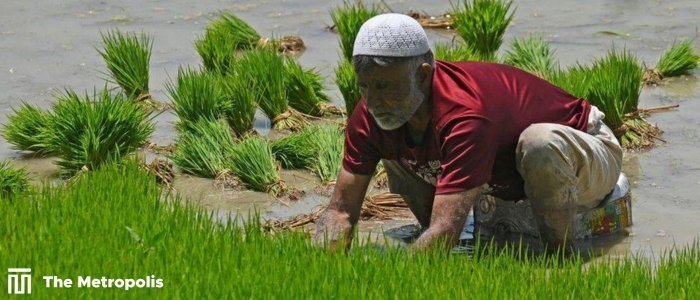Photo: Getty Image-
Metropolis Desk-
To prevent impending price increases at home, India has made the export of non-basmati white rice illegal. Rice prices have increased by more than 11% in the past year as a result of the country’s crops being damaged by heavy rains.
According to the Ministry of Consumer Affairs, non-basmati white grain currently makes up around a quarter of India’s rice exports. Experts cautioned the action might increase the price of food globally.
Due to Emma Wall, head of financial analysis and research at Hargreaves Lansdown, “It’s fair to say that this will have quite an impact on global food prices.”
Following Russia’s pullout from a pact this week that guaranteed the safe passage of Ukrainian commodities, particularly wheat, food supplies are already under pressure.
The majority of rice shipments worldwide, or more than 40%, are sent from India. The majority of non-basmati rice export destinations are in Asia and Africa.
To deter international sales, the Indian government implemented a 20% export tax last year. Shipments of sugar and wheat have also been restricted. However, for Indian farmers, exporting might be more profitable than domestic sales.
Farmers will still be able to export other varieties of rice, such as long-grain basmati, according to the government, guaranteeing that they “get the benefit of remunerative prices in the international market.”
Due to the Directorate General of Foreign Trade, the state would also take requests for permits to send goods to other nations into account if such requests are necessary for food security. Food prices worldwide increased as a result of the invasion of Ukraine last year.
Even if those pressures have already subsided on a global scale, in India, poor weather has harmed crops in many northern states, driving up the price of various goods, including tomatoes and onions. From May to June, vegetable prices increased by 12%, which added to the increase in living expenses. Due to rising food prices, inflation increased last month to 4.8%, which was higher than anticipated.
Ahead of the country’s elections next year, political pressure from the rising cost of living has been placed on the Indian government. In the upcoming months, there will also be elections at the state level in the nation.
Indian agriculture policy specialist Devinder Sharma claimed that the government was attempting to prevent a production shortfall while also preparing for the possibility of dry rain in the south’s rice-growing regions later this year when the El Nino weather pattern moves in.
He claimed that the government was acting “very, very cautiously.”
Source- BBC News



